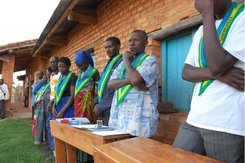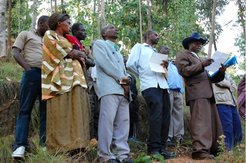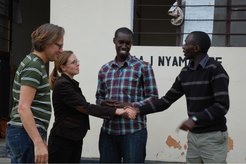The Promise of Access to Justice in Rwanda
My ethnography, “The Promise of Access to Justice in Rwanda” addresses the implications of contemporary re-makings of legal institutions. The study considers repercussions of the aftermath of genocide and its legal redress. I argue that transitional justice mechanisms in post-conflict contexts, such as Rwanda, produce their own afterlife. Today the Rwandan justice system has become a site of continuous transformation, experimentation and juridification. The making of law gains momentum and has shifted the threshold of the justice system. I argue that emerging legal institutions and involved actors reiterate past violence and injustice by investing in certain forms (of legal aid or dispute resolution in mediation committees). I show how these organizational forms and legal institutions are embroiled in violent history and hopes/anticipations of a better future.
In my ethnographic fieldwork I trace actors/complaints/cases and their forms of inscription on the threshold of the Rwandan justice system. By resorting to the ethnographic method of extended cases, I follow individuals in their tireless pursuit of rights and justice. Against the dynamics of gain and loss, beneficiaries and claimants have to mobilise persons and resources and develop competences. Given the need to navigate new institutional arrangements in local governance structures and the necessity to calculate transforming organisational assemblages of providing access to justice, actors' capabilities and strategies are put in focus. The analysis thus follows legal aid/mediation provided to actors on the threshold of the justice system.

In establishing legal aid and mediation as forms of organizing access to institutions of the justice system, Rwandan legislation/legal institutions are anticipated to right the wrongs of the past by including ordinary Rwandans in the legal sphere. Focus groups of beneficiaries of legal aid and disputing parties in mediation committees include, but are not limited to the poor, elderly, widows, divorced spouses, children, genocide survivors and orphans, returnees and repatriates or simply peasants. My study is also an attempt to consider the capacity of ordinary Rwandans/peasants in the making and analysis of legal institutions on the threshold of the justice system.
Access to justice is anticipated to improve precarious living conditions, especially of the rural population. I understand precarious conditions to include living circumstances in extreme poverty defined by everyday uncertainties with regard to food, subsistence and land, housing and property, and violence and conflict. These are categorical problems that roughly define the study group on the one hand and render Rwandans eligible to legal aid or mediation respectively when the making of a case is considered a favourable itinerary (as in the above vignette) and ordinary Rwandans cross the threshold to the justice system.
For both legal aid and mediation I trace genealogies of disputes which include but are not limited to access and rights to land, matrimonial regimes, succession and securing land through disputing and titling. Such disputes often contain several layers of dissatisfaction or unarticulated feelings of injustice. As in the above case, I show throughout my thesis how claimants recur to general forms (accepted, abstracted) when I trace dispute transformations from ‘real’ to ‘processed disputes’. How are disputes made in legal aid and mediation? The significations of dispute and disputing in a post-conflict setting and under circumstances of overpopulation and extreme scarcity of land:
- When and how do disagreements (not) qualify to become disputes?
- Dispute process, procedure and form
- Dispute creation, prevention and settlement
- Significations of witnesses and forms of evidence (formalisation), writing and filing (officialdom)
- The role of creative competences and critical capacity of claimants and disputants
Focus: Mediation

I show how the global travelling model of mediation as informal/alternative form of dispute resolution, is translated into a post-conflict context as a mandatory organizational extension of the justice system which relies upon voluntary mediators – mandatory voluntarism, which can be generalized for other contemporary forms of Rwandan legislation and policy-making. Mediation in the Rwandan context is (not necessarily an alternative mechanism of dispute resolution), but a legal fix responding to the need to make the justice system accessible in order to settle disputes of claimants in precarious conditions. But I also show how legal aid/mediation because of their situational flexibility and openness to negotiation as such hold a certain promise with regard to the Transformation of social relations of disputants (Bush and Folger 2005) and in their orientation towards the future (Menkel-Meadow 2004) since both evoke hope for peaceful social relations and integration as a core anticipation of social ordering.
- What are the forms and functions of mediation on the threshold of the justice system? Regimes of action in mediation. What actors and mediators can do in mediation.
- The capacity of mediation to introduce multiple forms of justice: distributive, procedural, social justice in reconciliation and dispute settlement
- How customary legal designs are invoked/iterated/introduced in evidence-based making of law and the dynamics they hold for mediation situated between creative competences and law.
- I show how lost values, such as trust in institutions are re-established by law, evoking ideas and practices from pre-colonial times, such as integrity of legal personal (mediators, local authorities)
- I explain popular participation in mediation and its acceptance in local communities by recurring to its associations with “Rwandan culture” and the aspiration of finding “homegrown solutions” to present challenges
- In going against assumptions that mediation in Rwanda provides a space for legal pluralism (customary law), I analyse what is iterated and what is silenced in the law governing mediation. From there, I develop a matrix of love and justice as competences in mediation.
In showing how legal institutions rely on confirmation and critique, I follow actors in their critical capacity to confirm/challenge institutions. My empirical material shows that formalisation and institutionalisation of access to justice in Rwanda, not only provide spaces for collaboration and critique but make actors seize competences creatively.

However, I also point out caveats of legal aid and mediation as forms to reorganize the justice system into an inclusive, user friendly, pro-poor and all-embracing institution. The promise of access to justice comes with the belief to ease the enormous gravity of juridification and remedy to exploit legal means. But on the contrary, it reinforces the making of law as a promising vision of inclusive citizenship (legal citizenship) and equal participation through legal rights, their enforcement and accessibility. So that providing access to justice and the reinforcement of law promote and provoke each other.
I trace the controversy over the organisation of access to justice for the Rwandan context (who provides access to what, and for whom?)
- I illustrate an actor network of fragmented legal aid and unequal access to justice
- I also touch upon the access to justice and local governance nexus: and sketch how forms of collaboration are necessary for the implementation of decentralisation and policy implementation
The overall PhD project contributes to pragmatic social theory and show what actors (ordinary Rwandans) can do with the assistance of legal aid and which creative and critical capacities actors develop in mediation. Depending on these capacities and on itineraries chosen to pursue on the threshold of the justice system, legal aid and mediation can be mutually interconnected and collaborate with regard to the making of cases, prevention/creation of disputes.

My thesis shows how (re-)creations of trust and integrity, compassion, hope and social cohesion are inscribed in legal institutional designs in order to provide for spaces of participation through the evocation of legal justice. [L]egal instruments appear, […]to offer a means of commensuration: a repertoire of standardized terms and practices that, [...], permit the negotiation of values and interests across otherwise intransitive Iines of difference” (Comaroff 2006: 11). But my thesis also accounts for what Habermas calls the “crisis of juridification”.
This process of social ordering through the making of law and juridification shows how legal aid and mediation are ever incomplete attempts to produce more predictability/certainty of the justice system with regard to the outcome of disputes and pacification of social relations. Thus social ordering may have unintended consequences that provoke yet new anticipations of social ordering.



